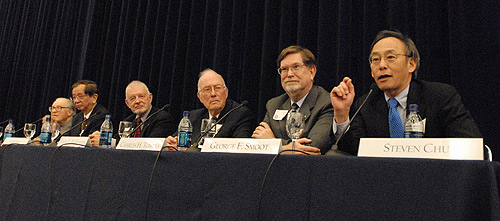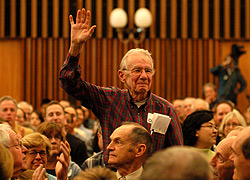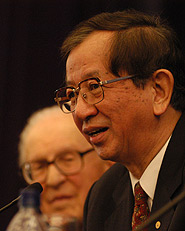Berkeleyan
 From left to right: Nobel laureates Donald Glaser, Yuan T. Lee, Daniel McFadden, Charles Townes, George Smoot, and Steven Chu took turns presenting their visions of energy self-sufficiency to a 900-strong crowd in Pauley Ballroom.(Peg Skorpinski photos) |
'There is no time' - a global call to action
Six Nobelists say that averting the climate crisis requires immediate energy research, conservation, and regulation
![]()
| 26 January 2007
Last week, the Bulletin of the Atomic Scientists moved the minute hand of its famous Doomsday Clock two minutes forward, to five minutes to midnight. The clock is a simple metaphor for how close humanity is to self-annihilation. The latest adjustment was made in response to both the global failure to address nuclear weapons and - for the first time - a non-nuclear-related issue: the climate crisis.
Both climate change and nuclear power were touched on repeatedly during the sold-out "Energy Self-Sufficiency in the 21st Century" campus colloquium on Jan. 20, which featured six of the seven Nobel laureates currently on the Berkeley faculty. The forum's participants agreed that doing nothing will indeed result in apocalypse - but also that humanity's prospects are far from hopeless, if we act now.
Following an introduction by Chancellor Birgeneau, Steven Chu - winner of the 1997 Nobel Prize in Physics and director of Lawrence Berkeley National Laboratory (LBNL) - began by saying he wanted to insert the word "clean" into the program's title, to make it "Clean Energy Self-Sufficiency in the 21st Century" - referring to carbon-neutral forms of energy that do not contribute to greenhouse gases.
Self-sufficiency could be achieved simply by "taking coal and liquefying it," he said, "but that would be an unmitigated environmental disaster." Chu, who is overseeing LBNL's groundbreaking research into alternate energy technologies, continued: "The reason I have become so passionate about the energy problem is that the earth is warming up. That's not a matter of debate; it's a matter of measurement."
Switching from doomsday scenarios to optimism, Chu said, "The good news is we can do something about this."
 McFadden singled out Art Rosenfeld, a professor of physics at Berkeley and LBNL who was in the audience for the talk, to stand and be recognized as the driving force behind California's record of conservation. |
Berkeley Lab's Helios Project and other initiatives are already hard at work on converting solar energy into carbon-neutral forms of transportation fuel. Researchers are exploring how to improve the conversion of plant material into liquid fuels and are developing a new generation of solar and photovoltaic cells that can more efficiently generate and store electricity.
With photovoltaic cells that were at least 15 percent efficient - that could convert at least that much of the sun's energy shining down on them into electricity - installed on a relatively small patch of desert, we could power the entire country, Chu said.
The United States already generates some of its own transportation fuel from plant matter in the form of ethanol from fermented corn. However, corn is what is known as an "input-intensive" crop, requiring so much chemical fertilizer and herbicides, plus energy to turn it into fuel, that critics question whether growing it for fuel is actually a net energy loss. Five to 10 years from now, Chu promised, researchers will have developed a new set of plants that will make fuel from biomass much more economically friendly. And by studying the lowly microbes living in termites' guts, which are able to convert cellulose into energy on a microscopic level, researchers will be able to convert biomass to fuel much more easily and efficiently.
But for these goals to become reality, the Berkeley Lab needs funding, Chu said, concluding his talk with a plea for donations for Helios while the center awaits major grants.
"We want to get started today," he explained. "There is no time."
Self-sufficiency begins at home
The five speakers who followed Chu all agreed that time is of the essence as global temperatures rise, and that a vitally important first step is for all Americans, not just Californians, to embrace energy conservation immediately.
California is way ahead of most U.S. states when it comes to energy conservation, thanks in no small part to the decades-long research and lobbying efforts of Art Rosenfeld, a professor of physics at Berkeley and LBNL. By serving on the state's energy commission and advising its governors, Rosenfeld has helped ensure that improved efficiency standards for appliances and buildings are integrated into California's codes.
"More than any other person, Art Rosenfeld has showed us as a practical matter how we can approach energy self-sufficiency," said Daniel McFadden, winner of the 2000 economics prize. (Read more about Rosenfeld's work in California magazine's current issue.)
Ultimately, said McFadden, the "best answer is to 'just say no' to energy." Conservation is "the ultimate green renewable-energy source. Each BTU [thus] freed up displaces a BTU of imported fossil fuel and also the capital cost of processing and transporting it."
That's why gains in efficiency have roughly offset gains in income; that is, U.S. energy use per dollar of GDP has actually decreased. Startlingly, improved refrigerator standards alone save more energy every year than is generated by all of the conventional hydropower and renewable energies like wind and solar. And there are other areas crying out for similar improvements, such as fuel efficiency standards for cars and trucks, said McFadden, which are set at the national level.
McFadden proposed some concrete economic changes that he thinks would make the U.S. energy self-sufficient by the year 2050:
. A substantial carbon tax that would reduce demand, encourage voluntary conservation, and make fossil-fuel prices reflect their true geopolitical and environmental costs.
. Revenue from the carbon tax could finance conservation and renewable-energy technologies.
.Tradeable CO2-emission licenses to promote the best use of fossil fuels.
Donald Glaser, winner of the 1960 Nobel Prize in Physics, seconded the importance of government regulation. "The free market is a wonderful mechanism, but it often doesn't work," he said. Consumers are often reluctant to pay more up front - say, for a new energy-efficient refrigerator - in exchange for future savings, unless forced to do so.
The lowest-hanging fruit on the conservation tree is vehicular fuel efficiency, Glaser argued, but Congress has refused to pluck it. The same has held for subsidies on oil, until very recently. "Yesterday, for the first time, the Democratic Congress reduced the level of subsidies for oil, which will make oil more expensive and give alternative fuels a fighting chance," he said, to cheers.
Rethinking nuclear power
One alternative fuel that George Smoot, winner of last year's Nobel Prize in Physics, would like to see have a fighting chance is already in use but languishing: nuclear power.
Smoot pointed out that 103 nuclear plants in the United States generate 20 percent of the nation's total electricity and, more importantly, more than 70 percent of its emission-free power. Berkeley is famous for being a "nuclear-free zone," but like it or not, Smoot argued, "Nuclear energy is one of the ways that we're going to maintain a high standard of living in this country."
That is, if we make nuclear power a national priority, as France has. The vast bulk of our existing reactors were built and staffed in the '70s, and as those plants age and their employees approach retirement age, there are no new technology or trained personnel ready to replace them.
Smoot concluded his presentation with suggestions for getting new nuclear-power plants online. The first step would be to address public-acceptance concerns, followed by developing programs for nuclear engineers and supporting research into improved nuclear technologies. Nuclear "parks" should be set up in remote areas for security. His most controversial suggestion is for the federal government to license only four or five companies to build and operate nuclear-power plants - not the 70 or so independent utilities that currently do so - which would vastly improve safety and accountability.
Later in the forum, when the Nobel laureates had the chance to discuss each others' views, Glaser pointed out that no one had addressed the real problem of nuclear power: storing radioactive waste from reactors.
Jumping in, Chu answered that technologies in the pipeline would shorten the radioactive lifetime of that waste from a couple hundred thousand years to a more manageable few centuries, as well as reduce the amount of waste by a factor of 10 to 30. That these technologies are not yet commercially viable is indeed a major roadblock to ramping up nuclear power: "If we continue as we are now, we will have filled up Yucca Mountain [the contested U.S. storage facility for nuclear waste] by 2012," said Chu. "Except we won't have opened Yucca Mountain by 2012."
It takes a global village
 Lee, 1986 laureate in chemistry, said humanity is "dependent to the point of addiction on energy from fossil fuels." |
While his colleagues debated individual technologies that might lead to energy self-sufficiency for the United States, Yuan T. Lee, winner of the 1986 Nobel Prize for Chemistry, delivered a rousing call to action on a global level.
Speaking softly and urgently, using no slides or transparencies, Lee described how fast Earth has devolved in the last few centuries: from an unlimited trove of resources to a planet rapidly approaching an inability to support its entire human population or to digest its waste production. For the first time in history, humanity is confronted with truly global problems to solve, and it is up to the United States to lead the charge.
Why America? Because this nation is far and away both the biggest energy user and polluter, said Lee. And since history has shown that so-called "developing" countries tend to follow in the footsteps technologically of the "developed" countries, the United States must lead by example: it must create and adopt renewable- and clean-energy sources as soon as possible, Lee urged, so that they will be available to meet the exploding energy needs of China, India, and South American countries.
If not, the consequences will be dire. "We cannot go on as we have been. Things have to change, and we are the ones who must make it happen," he said. "Not 'we' as in the people up here speaking to you today, but 'we' as in everyone in this room, and everyone walking around outside, and everyone who thinks tomorrow should be a little bit better than today. We have to face the problems from energy use and its impact on our environment."
The clock is ticking.
A webcast of this Discover Cal event is available at webcast.berkeley.edu/events.php.

